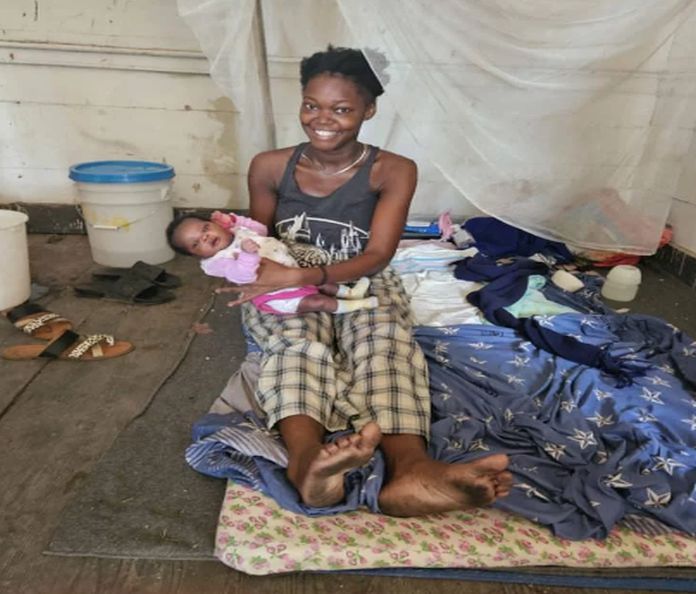PORT AU PRINCE, Haiti – Given the magnitude of the health needs in Haiti, ALIMA works on the ground to provide healthcare to the most vulnerable populations in the metropolitan area of Port-au-Prince, the island’s capital. It is one of the few international medical NGOs working in the area.
The ALIMA team found Sophia behind a curtain of rags, sitting on a makeshift mattress with her newborn baby in one arm. Four months prior, the young woman had left her home in Cité Soleil, a Haitian community of 400,000 to 600,000 people living in extreme poverty. She had fled gang violence to save both her life and the life of her future baby.
For several years now, Haiti’s capital has been ravaged by violence and poverty. Nearly 200,000 people were forced to flee their homes in 2023, ten times more than in 2021. More than 5.5 million people – nearly half the population -will need humanitarian assistance and protection in 2024.
Makeshift camps for people fleeing violence
Sophia is a refugee in a camp for people who, like her, have been forced to leave their homes to survive. The makeshift camp is located in a school in a central district of the capital where 1,700 people live without enough drinking water or food, as the distribution of hot meals has been interrupted.
“Camps are improvised in abandoned schools. Families are sleeping in classrooms, courtyards, and school parking lots in the rain. People need emergency multisectoral aid,” testifies Isaac Assaraf, head of logistics for ALIMA’s emergency service, who witnessed the situation at the end of November 2023.
Just before she fled, the young mother benefited from a first prenatal consultation three months into her pregnancy. Since then, she’s received no medical care. Thanks to the camp’s management committee, Sophia was able to give birth out of sight in a sheltered space. But since the birth eight days ago, the baby boy has not received any care, and neither has she.
Without public services, there is almost no access to health care
For economic, security, and geographical reasons,* “access to health care has become a privilege for the population”, says Dr Rodrigue Alitanou, head of ALIMA’s emergency department. The majority of health facilities are dysfunctional. “We visited several facilities during our exploratory mission. Some were struggling to accommodate a few patients, while others were completely closed.”*
In late November 2023, two days after the ALIMA team visited La Fontaine Hospital, the last private hospital in Cité Soleil, the facility was attacked and looted by a gang. The patients had to be evacuated. Today, the Chancerelles public hospital is the only health facility left in the district, and everything is in short supply: drinking water, electricity, equipment, medicines, staff, etc.
The maternity ward lacks the proper equipment needed to care for women giving birth, and medicines are in short supply. The neonatal unit is equipped with incubators, but, unfortunately, nothing works.
Cholera outbreak: A public health emergency
Access to patients is a challenge for all health professionals, including humanitarian workers, not only because of the lack of security but also because of the topography of the Cité Soleil district. The only road in and out of the area is a flooded path bordered by an open-air dump filled with piles of trash in stagnant, disease-carrying water. A cholera outbreak is currently raging in the area.
As an expert in outbreaks and emerging diseases, ALIMA supports the local authorities in their response to the cholera outbreak, which continues to spread. The teams treat patients, provide medicine, build the capacity of local health workers, and conduct awareness campaigns using community facilitators to strengthen the long-term impact of the response.
In addition to responding to the cholera outbreak, mobile clinics in IDP sites provide primary health care (curative, preventive, and promotive essential health care) to people living in extreme poverty. Moreover, displaced populations and host communities will have renewed access to primary and emergency neonatal and obstetric care at the maternity ward of the Chancerelles Hospital in Cité Soleil.
True to its alliance model with local actors, ALIMA works in partnership with a Haitian NGO, combining the deployment and mobilization capacity of an international NGO with the field and community knowledge of a locally rooted NGO.
ALIMA’s emergency response in Haiti reflects its core mission and identity: to go where no one else will go, to provide care, and to ensure the long-term impact of its actions.
Source: ALIMA





